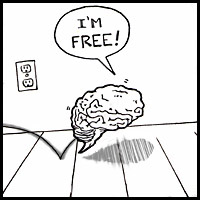ADHD: Don't Blink
 Ever wonder what it feels like for a person with AD/HD to pay attention when they are bored? If you can keep your focus to the end of today's blog you might just find out.
Ever wonder what it feels like for a person with AD/HD to pay attention when they are bored? If you can keep your focus to the end of today's blog you might just find out.If I was worried about being bored when I began this week, it turns out I had nothing to fear. My girls have kept me so busy that I haven't had time to breathe, nevermind find time to be bored. Keeping busy, of course, is one way to fend off boredom for any individual. With the AD/HD mind, however, we need to plan in advance if we want to prevent ourselves from getting in trouble. Sometimes, keeping busy is not an option.
When dealing with boredom and the AD/HD mind it is important to realize that the AD/HD mind doesn't actually spend much time being bored at all. Picture the AD/HD mind with a special teflon coating that repels boredom with efficiency. This process is nearly instantaneous.
Hallowell and Ratey defined this attention issue for AD/HD people as a general intolerance for boredom. "Actually," they claim, "the person with ADD seldom feels bored. This is because the millisecond he senses boredom, he swings into action and finds something new; he changes the channel." When the person with AD/HD tries to fight this process, the feeling can be excruciatingly uncomfortable. The best analogy I can think of for non-AD/HD people to understand this process is to compare it to trying not to blink. You know that feeling you get when you are keeping your eyes open and your entire being shouts "Blink!"? Well, that's what it feels like for an AD/HD person to stay focused on something that is boring. It is physically and mentally uncomfortable.
I don't know if you will find that analogy useful, but I am certainly glad I thought of it. Now I'll be better equipped to help my own AD/HD daughter instead of getting mad at her. We all blink from time to time when dealing with dull issues, but people with AD/HD tend to blink more and wander off while they're doing it.
Like reading The Splintered Mind? Share articles with your friends, link from your blog, or subscribe!
Comments
Sarah.
And does your daughter have AD/HD or the inattentive kind? I tend to zone out myself.